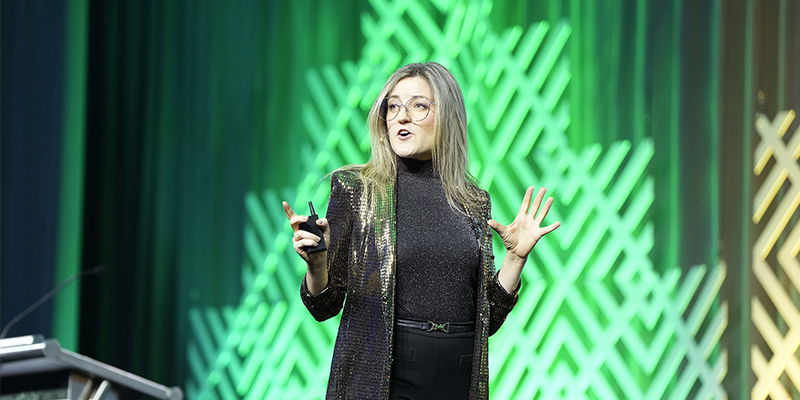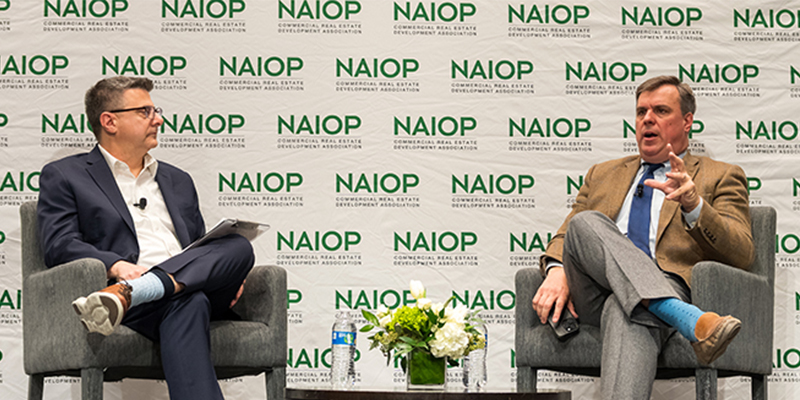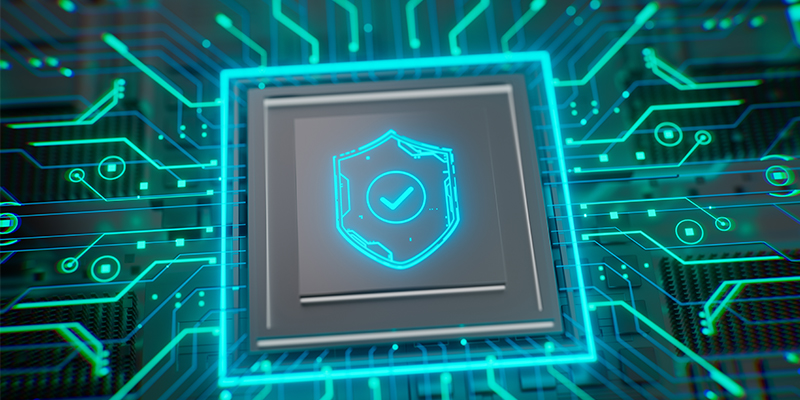Nikki Greenberg is a world-leading futurist focused on the trends and technologies shaping cities of the future. A true digital nomad with an international career that has spanned the U.S., Asia and Australia, she has held cross-functional leadership positions with a focus on innovation and design.
At CRE.Converge this week in Las Vegas, her keynote explored the possibilities of emerging technologies and introduced innovative ways of thinking.
“I believe that we’re actually living in the most exciting time in history,” began Greenberg. “We’re living in this world of the metaverse, humanoid robotics and AI.”
Technology has, for a long time, impacted the real estate industry, she pointed out – elevators led to greater density and tall cities, cheap cars led to freeways and the advent of suburbia and urban sprawl. With the cloud, now people can work from everywhere, “and we’ve all seen the disruptive impact that has had on the office market.”
We’ve had waves of innovation throughout history. In 2020, we’ve started the sixth wave of innovation – the era we’re in today, Greenberg said. The wave of AI, smart devices, clean technologies, robotics, drones. It’s a disruptive moment, a fundamental change.
“It’s up to us as an industry to embrace the changes that are coming,” she said.
Both as organizations and as individuals, how can we meet the moment? Greenberg shared five principles for being future ready:
- Be core. “To be core is really to concentrate on the things that make your organization unique. What is essential? Imagine if you lost your entire organization and you had to rebuild on day one. What might that look like?” The problem is that so many of us just never take the time to look at our processes, look at our systems, and ask what can we get rid of? What can we trim down?”
- Be flexible. “To be flexible is to understand that the world is changing… We want to be able to [move quickly] when new technology comes up that is better for us to use.” Greenberg emphasized the importance of giving managers more autonomy over their team, where and how they work and what they use to do the work.
- Be curious. Maybe the most fun step of all. “Ask your kids, ‘How do you see the world? How do you interact with it? What’s that game you’re playing? What are your friends talk about?’” It’s speaking to vendors, inviting them in, learning about their technology. “That annoying pop-up on your computer that says, hey, we’ve got a new feature. Do you want to try it out? We always say no – take the time and learn how to do things in a different way!”
- Be willing to do different. This might be the most difficult task. “This is about understanding that the systems and processes that we have in place were developed in a time that was very different to today.” Being willing to do different is the most fundamental thing because this is about acting, she added.
- Be a visionary. We talk about great athletes, leaders as the “GOAT,” the Greatest of All Time. “To be a visionary really means that you as an individual want to leave a legacy. You want to do great things, and you’re willing to take the risk. If we as leaders want to stay relevant, if we want to compete, we need to be risk-takers, to use everything at our disposal.”
Greenberg also shared future-forward projects around the world to be inspired by.
The Toyota car company has created what they call Woven City at the foot of Mount Fuji. This master-planned city is where they can test out their autonomous vehicle technology in a controlled environment. “They’re actually creating this sandbox or testing ground just for themselves in the physical world,” she said.
Then there’s Cryptopia in El Salvador. “If you’re not familiar with the term cryptopia, this is the combination of cryptocurrency and utopia… essentially El Salvador is trying to encourage cryptocurrency industries to come over to [the country], and they see them creating almost like the new Wall Street, because this is such a great opportunity.” Creating cryptocurrency – also called mining cryptocurrency – takes a lot of power. The development is relying on geothermal energy, which is why it’s sitting at the base of a volcano, to be able to bring the power that they need.
“And finally, just in case you were wondering whether everything can and should be impacted by technology, in Beijing they now have digital cemeteries,” Greenberg added.
“I will leave you with a final thought: The extraordinary places of the future are being built today.
And it’s passionate people like you all who can make it happen.”
This post is brought to you by JLL, the social media and conference blog sponsor of NAIOP’s CRE.Converge 2024. Learn more about JLL at www.us.jll.com or www.jll.ca.









